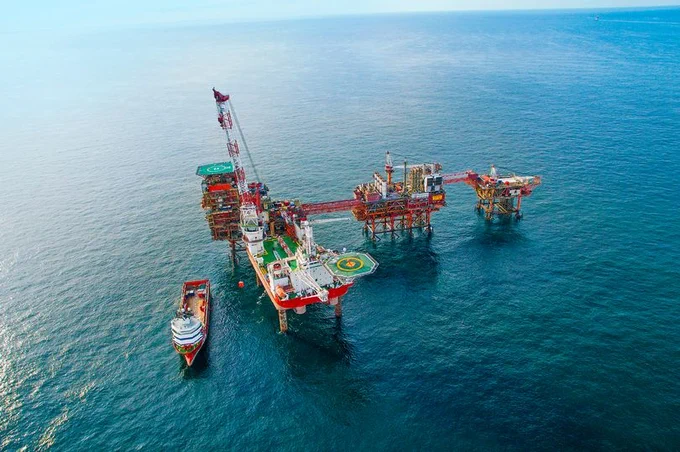Campaigners have accused the North Sea Transition Authority of cosying up to oil and gas producers. The UK’s oil regulator, they fear, is no longer impartial. The North Sea Transition Authority is the rebranded body formerly the Oil and Gas Authority. Since its inception, the NSTA has issued hundreds of new licences, much to the dismay of environmental campaigners. Now it appears that as part of a thinly veiled collaboration with firms such as Shell, the authority wants to change the public “narrative” to “effectively make the case for continued North Sea oil and gas”. Published meeting notes reveal that the NSTA has been helping fossil fuel companies spin a pro-gas and oil message, leaving campaigners doubting the authority’s independence and impartiality.
The North Sea Transition Authority published the minutes of a 9 May meeting on its official website, itemising the content and minutes. Stuart Payne, NSTA chief and Shell’s UK business head Simon Roddy co-chaired the meeting.
Representatives from Offshore Energies UK, the industry lobby group and executives from other fossil fuel firms also attended the meeting. Under the heading “Oil and Gas narrative”, the minutes reveal that those present at the meeting “would like to develop three to five key messages that are coherent and consistent, to effectively make the case for continued North Sea oil and gas”.
The group identified a need for “simple positive messages, e.g., ‘In 2022, UK spent more on importing oil and gas than on Education’, ‘homegrown is better'” and that “the industry needs to be more vocal and amplify the key messages”. It goes on to state that “young professionals could play a key role in developing and sharing the messages”.
On the NSTA website, the authority sets out the job of the North Sea Transition Authority steering group as discussing and reviewing “key strategic issues affecting the oil and gas industry”.
In the face of such close collaboration between the NSTA, a government body, and big oil and gas companies, the blatant push for the creation of a pro-fossil fuel narrative has caused dismay among environmental groups.
Speaking to Sky News, Uplift executive director Tessa Khan said:
“It is the NSTA’s job to make unbiased, evidence-based decisions on whether or not to approve new oil and gas fields, yet, astonishingly, we find it’s been colluding with industry lobbyists on how to best make the case for new drilling.
“How can the public be expected to trust its decisions if, at the same time, it’s helping oil and gas firms with their PR? The last thing the UK needs right now is yet more misleading spin on oil and gas.
“This casts doubt on how seriously the regulator is taking its role of helping the UK meet its climate obligations. The proposed Rosebank oil field, for example, is incompatible with the regulator’s own climate targets, but will the NSTA say ‘no’ to an industry it is clearly so cosy with?
“The UK urgently needs a regulator that is genuinely independent of the oil and gas industry.”
The government insists it can pursue an expansion of North Sea drilling while at the same time ramping up clean energy production to reach the UK’s legally binding net-zero targets.
Conflict of interest questions to answer for NSTA leaders
More than a year ago, questions about the impartiality of NSTA leaders emerged with revelations that several own shares in fossil fuel companies. According to a Herald article published in July 2022, three NSTA board members “combined shares worth £428,000 in companies involved in the oil and gas industry”.
As the body issues licences for new gas and oil projects, campaigners called for transparency regarding potential conflicts of interest. The NSTA relented and published details in the regulator’s annual report.
NSTA chief executive Tim Eggar saw his shares of over £83k in MyCelx rise by over £26k. A family member with BP and Shell shares worth over £54k reaped more than £17 in value increases.
Non-executive director Iain Lanaghan had BP and Shell shares which rose in value from over £7k to over £11k between 2021 and 2022.
The biggest payday fell to Frances Morris-Jones, another non-executive director who has since left the North Sea Transition Authority. Her BP and Conoco Philips shares jumped by £100k between March and September 2021.
Speaking to The Herald, Friends of the Earth Scotland campaigner Ryan Morrison said:
“It is a clear conflict of interest that these individuals who are supposed to properly oversee these companies have a huge financial stake in their continuing with climate-wrecking business-as-usual.”
In response, an NSTA spokesperson said:
“In accordance with the NSTA’s conflict of interest policy, directors must declare any financial interests which may or may be perceived to influence their judgment in performing their duties as directors of the NSTA.
“This is done on appointment and annually.
“Directors are further asked to declare any conflicts of interest at the start of each board meeting. If a director declares a conflict of interest with any agenda item, they will not participate in the discussion of that item.”
The UK government announced last month that it intends to issue hundreds of new licences.
The UK government has announced that they are granting hundreds of new North Sea oil and gas licenses. The North Sea Transition Authority (NSTA) is expected to grant the first license in the Autumn. pic.twitter.com/9VRXj5Cw50
— James Melville 🚜 (@JamesMelville) July 31, 2023




